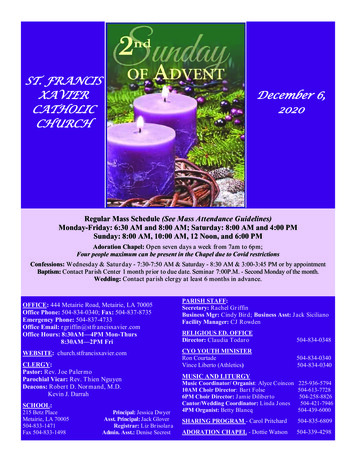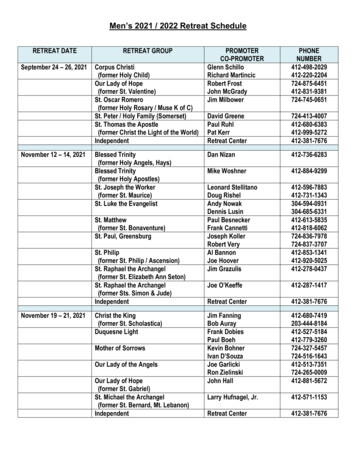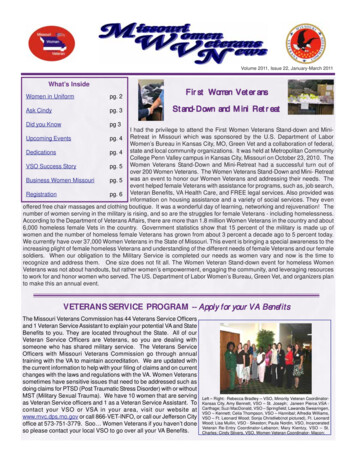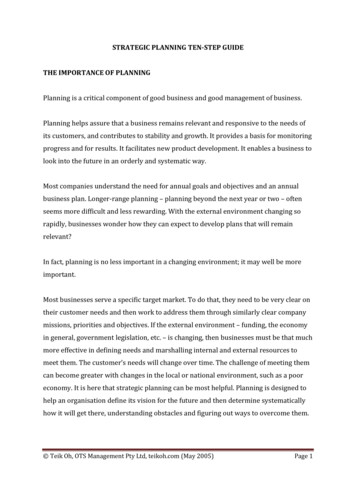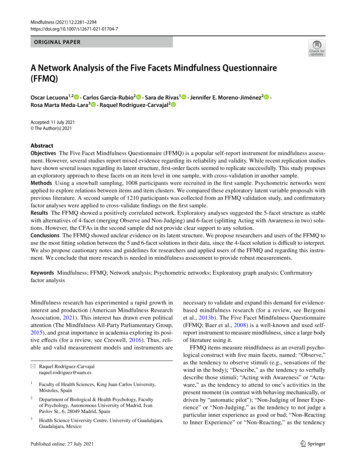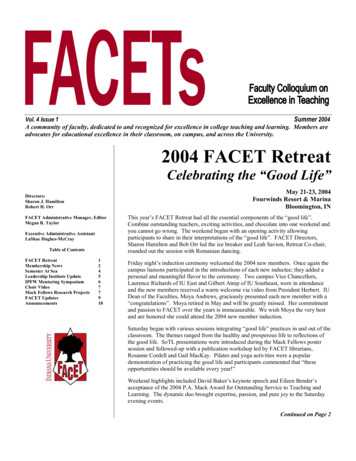
Transcription
Vol. 4 Issue 1Summer 2004A community of faculty, dedicated to and recognized for excellence in college teaching and learning. Members areadvocates for educational excellence in their classroom, on campus, and across the University.2004 FACET RetreatCelebrating the “Good Life”May 21-23, 2004Fourwinds Resort & MarinaBloomington, INDirectors:Sharon J. HamiltonRobert H. OrrFACET Administrative Manager, EditorMegan R. TaylorExecutive Administrative AssistantLaShae Hughes-McCrayTable of ContentsFACET RetreatMembership NewsSemester At SeaLeadership Institute UpdateIPFW Mentoring SymposiumChoir VideoMack Fellows Research ProjectsFACET UpdatesAnnouncements1245677910This year’s FACET Retreat had all the essential components of the “good life”.Combine outstanding teachers, exciting activities, and chocolate into one weekend andyou cannot go wrong. The weekend began with an opening activity allowingparticipants to share in their interpretations of the “good life”. FACET Directors,Sharon Hamilton and Bob Orr led the ice breaker and Leah Savion, Retreat Co-chair,rounded out the session with Romanian dancing.Friday night’s induction ceremony welcomed the 2004 new members. Once again thecampus liaisons participated in the introductions of each new inductee; they added apersonal and meaningful flavor to the ceremony. Two campus Vice Chancellors,Laurence Richards of IU East and Gilbert Atnip of IU Southeast, were in attendanceand the new members received a warm welcome via video from President Herbert. IUDean of the Faculties, Moya Andrews, graciously presented each new member with a“congratulations”. Moya retired in May and will be greatly missed. Her commitmentand passion to FACET over the years is immeasurable. We wish Moya the very bestand are honored she could attend the 2004 new member induction.Saturday began with various sessions integrating “good life” practices in and out of theclassroom. The themes ranged from the healthy and prosperous life to reflections ofthe good life. SoTL presentations were introduced during the Mack Fellows postersession and followed-up with a publication workshop led by FACET librarians,Rosanne Cordell and Gail MacKay. Pilates and yoga activities were a populardemonstration of practicing the good life and participants commented that “theseopportunities should be available every year!”Weekend highlights included David Baker’s keynote speech and Eileen Bender’sacceptance of the 2004 P.A. Mack Award for Outstanding Service to Teaching andLearning. The dynamic duo brought expertise, passion, and pure joy to the Saturdayevening events.Continued on Page 2
Learning opportunities and guidelines to publish SoTLwork. Charter Mack Fellows presented the session andprovided essential tips and information for those interestedin publishing their research in the SoTL arena. Enid Zwirnled the closing ceremonies. Those who stayed until the endof the retreat received door prizes representing the collective“good life”.David Baker is congratulated for his Honorary P.A. Mack Awardfrom P.A. himself at Saturday evening’s keynote presentation.Eileen shared her comments with us and below is an excerpt.You can find the full text of Eileen and David’s speeches onFACET Web.In accepting your generous award, I take my cue fromProfessor Baker’s memories of his own most influentialteacher – a person who moved his students to do “more thaneven they could imagine.” How does one define a greatteacher? David’s phrase seems exactly right.As scholars wedded to our intellectual pursuits (what wewrongly call “the life of the mind” as if it were disembodied),we know the thrill of trajectory (what we feel at the height ofour powers) as well as the inevitable frustration of learningour limits. Our best teachers, paradoxically, are those whoare able to convince their students not to believe in their limits– to move to places that are “more than even they couldimagine.”In turn, this reminds me of an experience I had in one of myown classrooms last semester. For the past few years I haveexplored and taught “Children’s Literature,” a doublychallenging course to teach because most of the students arefuture teachers themselves. It also requires members of theclass – myself included – to read the assigned literature with adouble consciousness: the mind of the child for whom thebook was intended; the mind of the adult asked to reflect onthe book’s own magical or technical composition. Like novicedancers, teachers of teachers perform before mirrors.This doubleness provokes metaphor, and indeed I believe Ihave found an apt metaphor for David’s evocative phrase inthe pages of the 2004 Caldecott Medal winner -- an award theAmerican Library Association presents to the best picturebook of the year. This year’s winner, by Mordicai Gerstein, isThe Man Who Walked Between the Two Towers.Excerpt from “Aerial Reflections”by Eileen T. Bender, May 22, 2004Sunday’s activities included a sing-a-long during whichparticipants crooned or sang many old favorites. The nextfeatured session involved the Scholarship of Teaching andWhether you attended the FACET Retreat as a presenter,participant, observer, or planning member it is clear thisyear’s retreat brought many smiles of satisfaction. If youwere unable to join us this year, we hope to share in thisexperience with you in 2005! An anonymous member sumsup the annual FACET Retreat experience so fittingly, wehad to share this quote with all of you:FACET is my psychiatric appointment for theyear. It continues to renew me and inspire me.My year is lost when I don’t have the FACETexperience.AWARDS & HONORSCharlie Barman, Professor of Education, IUPUI wasawarded the 2004 full time faculty Chancellor’s Award forExcellence in Teaching.Jon Becker, Associate Professor of Mathematics, was one ofthe recipients of a Trustees Teaching Award this spring at IUNorthwestChuck Gallmeier, Professor of Sociology andAnthropology, IU Northwest was invited as the 2003 NorthCentral Sociological Association Distinguished Contributionto Teaching Award Winner to give a teaching address at theannual NCSA meeting in Cleveland last April. The addresswas titled, "Reflections on Teaching: IntroducingSociological Virgins to the Sociological Imagination."Gallmeier's address will be published in Sociological Focus,the official journal of the NCSA.Eugenia Fernandez, Professor of Computer andInformation Technology, IUPUI was selected to attend theByrn Mawr Summer Institute for Women in HigherEducation Administration, June 27-July 23 in Bryn Mawr,PA. If you would like more information on the program goto http://www.brynmawr.edu/summerinstitute/Catherine Dobris, Associate Communication Studies,IUPUI received an SLA Trustees Teaching Award this year.Continued on Page 32
AWARDS & HONORS CONT’Julie Freeman, Senior Lecturer of English, IUPUI received aTrustees Teaching Award last spring.Richard Gunderman, Medicine/Philosophy, IUPUI recentlyreceived two teaching awards including the Robert ShellhamerOutstanding Educator Award from University StudentGovernment and Outstanding Clinical Faculty Award from thestudents in the School of Medicine.Juanita Keck, Professor of Nursing, IUPUI was honored as adistinguished alumna of the School of Nursing this past May15 and received a President’s award for distinguished teachingduring Founder’s Day in February.Paul Kriese, Associate Professor of Political Science andJoan Lafuze, Professor of Biology both received the IU EastStudent Choice Award this year.John LaMaster, Senior Instructor of Mathematics was namedIPFW's 2004 Teacher of the Year, awarded by the Friends ofthe University. John also is the first instructor in theUniversity to be promoted to the rank of Senior Instructor.Ruth Needleman, Professor of Labor Studies and Women’sStudies, IU Northwest received the Board of TrusteesExcellence in Teaching Award this year through IUPUI andco-received the Excellence in Research Award for her recentlypublished book from IU Northwest. The book is BlackFreedom Fighters in Steel: The Struggle for DemocraticUnionism.Dianne Roden, IU Kokomo received a Trustees TeachingAward and was promoted to full Professor of Finance thisspring. To the best of our knowledge, this makes her the firstfemale to be promoted to full professor of finance in the IUsystem.Walter Wagor, Professor of Psychology, IU East was NamedACE Fellow for academic year 2004-2005. The ACE FellowsProgram, established in 1965, is designed to strengtheninstitutions and leadership in American higher education byidentifying and preparing promising faculty and senioradministrators for responsible positions in college anduniversity administration. Thirty-five Fellows, nominated bythe presidents or chancellors of their institutions, were selectedthis year in a national competition. Each ACE Fellow willfocus on an issue of concern to the nominating institutionwhile spending the next academic year working with a collegeor university president and other senior officers at a hostinstitution. The Fellow will be included in the highest level ofdecision making while participating in administrativeactivities and learning about an issue to benefit IndianaUniversity East.Lillian Yeager, Associate Professor of Nursing, IUSoutheast was presented an award in recognition ofexceptional leadership to the nursing profession, patient careand the community by the Kyanna Black NursesAssociation at the 17th African American Nurses Conferenceof Kentucky April 16, 2004.PROMOTIONS & APPOINTMENTSJudith Elaine Blakemore, Associate Professor and Chair ofPsychology at IPFW, was promoted to full Professor,effective July 2004.Teesue Fields, Counselor Education, IU Southeast waspromoted to full Professor effective July 1. Also, thissummer she is an invited participant at a Research Summiton School Counseling, taking place prior to the nationalconference of the American School Counseling Associationin Reno, NV. Teesue will be presenting two papers at theconference as well.Susanmarie Harrington, English, IUPUI was promoted tofull Professor this year.B. “Tammy” Fong-Morgan, IU South Bend was promotedto Associate Professor of Spanish and granted tenure,effective July 1, 2004.Lawrence P. Garetto, Dental Education, IUPUI wasappointed to Associate Dean for Dental Education at theSchool of Dentistry, effective June 1, 2004.Neovi Karakatsanis, IU South Bend was promoted toAssociate Professor of Political Science and granted tenure.Stacy Morrone, IUPUI was promoted to AssociateProfessor and granted tenure in the School of Education.John Ross, IU Kokomo was promoted to full Professor ofComputer Information Systems after eighteen years ofteaching service at IU.Carolyn Schult, IU South Bend was promoted to AssociateProfessor of Psychology and granted tenure, effective July,2004.Cliff Staten, IU Southeast was recently promoted to fullProfessor of Political Science and just reappointed to histhird 3-year term as Dean of the School of Social Sciences.Also, his book History of Cuba was published byGreenwood Press last year.Enid Zwirn, Associate Professor of Nursing, IUPUIrecently moved to the Department of Public Health withinthe School of Medicine. 80% of her time will be spent there,advising and teaching the Behavioral Science MPH Majorsand the other 20% will be at the School of Nursing, teachingEpidemiology at the Executive Weekend Options Masters inCommunity Health Nursing program.3
PUBLICATIONSBarbara Cambridge, Professor of English, IUPUI recentlypublished Campus Progress: Supporting the Scholarship ofTeaching and Learning. It includes lessons from over fortycampuses that have worked to foster the scholarship ofteaching and learning. The book has five sections oninfrastructure, collaboration, policies, impact, and learningalong the way. She is author of the introduction and volumeeditor. Another FACET member, Richard Turner, is author ofa chapter in the book. The book is available on the AAHEwebsite at www.aahe.org.Jay Howard, Associate Professor of Sociology, IUPUColumbus was elected to the Bartholomew ConsolidatedSchool Corporation Board of Trustees on May 4th. He willserve a four-year term on the school board. Also, Jay recentlycompleted editing Discussion in the College Classroom, 2ndEdition, which will be published by the American SociologicalAssociation’s Teaching Resource Center in August 2004.Susan Shapiro, Associate Professor of Psychology, IU Eastwill be teaching from a farm in Volin, South Dakota next yearthrough Oncourse. She welcomes you to visit if you are in thearea, the phone there is (605) 267-2200. Below are some ofSusan’s recent publications.Shapiro, S.J. (2004). The use of computers in teachingintroductory psychology. In Instructor’s Resource Packagefor Weiten, Themes and Variations: Brief Edition 6ed,Belmont, CA: WadsworthShapiro, Susan J. (2003) Transparency Set for Weiten Themesand Variations 6ed. Belmont, CA: Wadsworth.Shapiro, S. J, (2003). Instructor’s Manual for Carlson’sPhysiology of Behavior. Allyn & BaconSBC Fellow – Integrating Laboratory Research intoPsychology CoursesIf you are interested in a “Semester At Sea” opportunity youdo not have to look far. FACET member Allen Maxwell canprovide all the details and help you get involved. Contacthim and see how close you can be to island paradise whilegaining a great teaching and learning experience! Discoverdetails below from Allen:In case you are not familiar with SAS, it is an academicprogram run by the University of Pittsburgh which takes600-630 undergraduates (primarily juniors) from over 200colleges and universities across the country around theworld on a 100 day voyage (both Fall and Spring). Thestudents take a full 12-15 credit semester of coursework.Classes meet while the ship is at sea; students and faculty goon field trips during the 4-5 day stops in Japan, China,Vietnam, Malaysia or Thailand, India, Kenya or Tanzania,South Africa, Brazil, and Cuba (we met with Castro for 4 1/2hours last December in Havana). Each voyage hires 25-27faculty to teach three courses - faculty come from collegesand universities across the country and are mostly from A&S- though a few business and education courses are offeredsometimes.The reason that I think FACET would be an ideal forum totalk about SAS is that one of the primary criteria for beinghired to teach on a voyage is excellence in teaching FACET faculty would be prime candidates for this lifechanging teaching opportunity. It really is an exciting andincomparable teaching experience for any faculty who havean international/global interest.Contact Allen for further information:amaxwell@iuk.eduRETIREMENTCraig T. Nelson, Professor of Biology, IU Bloomingtonretired as of May 31st, 2004. He is continuing to write andconsult. Additionally, Craig is having his house extensivelyrebuilt, adding a second greenhouse, birding more seriously,and plans to travel more.John Woodcock, Associate Professor of English, IUBloomington retired at the end of 2003 and is “working on thisfascinating new stage of life”.4
The 2004 FACET leadership institute was held in Indianapolisat University Place Hotel and Conference Center on April 2325. Participants representing all eight IU campuses took partin the first of three consecutive institutes focusing onCitizenship in the 21st Century World. Team memberscollaborated to formulate ideas, plans, and strategies to takeaway and share with campus administrators and other facultyon their respective campuses. The weekend was filled withuncertainty, excitement, and plenty of information sharing.IU NorthwestRobin Hass-BirkyDiana Chin LinDan LowryRanjan KiniJean PoulardEva Mendiata-LombardoPam Sandoval*Geoff SchultzIUPUIElsa IversonMarjorie LylesLarbi OukadaBob OsgoodScott PeggKen RennelsMary Beth Riner*Susan SuttonIU SoutheastJean AbshireJohnny AlsePeggy CumminsMagdalena Herdoza-Estevez*Joe WertIU South BendDe' BryantBill HojnackiNeovi KarakatsanisKwadwo Okrah*Scott SernauDave VollrathFriday opened with welcoming remarks from IUPUIChancellor Charles Bantz and Vice Chancellor Bill Plater.Each commented on the importance of faculty leadership andcollaborative efforts to internationalize the curriculum.A unique global perspective filled the room later in theafternoon when Satvinder Juss from Kings College Londonjoined the teams live via interactive video from abroad. Dr.Juss’s approach to stabilizing the global economy andrecognizing citizenship in its primitive form enlightened theparticipants and sparked a friendly debate. The issuesintroduced set a general tone for the weekend activities.The evening concluded with discussion and remarks fromkeynote speaker, Harry Boyte, Co-Director of the Center forDemocracy and Citizenship and Senior Fellow, Hubert H.Humphrey Institute of Public Affairs, University ofMinnesota. Dr. Boyte introduced a transformational approachto citizenship and global politics.Saturday brought yet another perspective, this time the focuswas on planning and implementation. Christa Olson from theAmerican Council on Education highlighted key areas tocreate, maintain, and implement plans for internationalizingthe campus. She discussed the importance of engagingfaculty, administrators, students, and staff at all levels to reachfull potential and elicit change.Leadership Teams by Campus:* Indicates Campus Team LeaderIU BloomingtonKathleen Claussen*Jeffrey HuntsmanChristina OchoaLeah SavionAnn Marie ThomsonIU EastSheila Armstead*Paul KrieseJoanne PassetT.J. RivardIPFWElliot BlumenthalMary Ann CainSteve Carr*Glenda MossIU KokomoDonna McLeanSue Ridlen*Allen SafianowMargo SorgmanLinda WallaceCampus team members discuss ideas duringSunday’s wrap-up activities.The participants formulated specific campus goals anddiscussed system wide plans to correspond periodicallythroughout the academic year. A late fall event to revisitgoals and check progress of campus teams is in the planningstages.Institute Recently NamedIU Credit Union Leadership InstituteThe Indiana University Credit Union awarded 50,000 to theIU FACET Leadership Institute for Excellence in Teachingat Indiana University, which will now be named the IUCredit Union FACET Leadership Institute. This endowmentwill help the nationally recognized institute fulfill itsmission to enhance outstanding teaching throughout the IUcampuses and to promote continued development ofteaching excellence among colleagues at IU and nationally.The Indiana University Credit Union began in 1956 as anemployee undertaking in the offices of Indiana University.Seven faculty and staff members each contributed 5 to forman organization with the purpose of allowing those involvedto save and borrow money. The IU Credit Union is now a 460 million full-service financial institution with 10branches throughout the state of Indiana. During its 48 yearsContinued on Page 65
of operation, the IU Credit Union has grown from a handful ofmembers to serving the financial needs of more than 65,000members. The Credit Union is pleased to be engaged in thesupport of FACET and excellence in teaching.This gift, endowing the FACET Leadership Institute, helpsensure that Indiana University continues to be a leader in thenational – and the international – dialogue on excellence inteaching. The Indiana University Credit Union has made itpossible for IU and FACET to move aggressively through the21st century to recognize and enhance outstanding teachingthroughout the IU system and to promote continueddevelopment of teaching excellence among colleagues at IUand beyond.What would the ideal mentoring program look like (ifresources were unlimited)?You have been given unlimited resources to create amentoring program for your institution or school ordepartment. What would your ideal mentoring program looklike?Peer Review Presentation, Yvonne Zubovic, IIPFW Discussion of Formative versus Summative Review Overview of the Reciprocal Peer Review Process Relationship between Peer Review and Mentoring Identify features of this program that were broughtout in the discussion on idealsKeynote by William Plater, IUPUI: The Role ofMentoring in the Faculty Career OdysseyDiscussion of Best Practices in MentoringGwen Mettetal, IUSBT.J. Rivard and Laverne Nishihara, IUELeni DeFonso, David Legg, and Kathy Pollock, IPFWPaul Wilder, IIT, Models on Mentoring for Leadership andStewardshipTwenty-nine faculty members from the IPFW, IUE, and IUNcampuses attended the Mentoring Symposium on the IPFWcampus on March 26, 2004. Outlines of the day’s activitiesand discussion questions are provided below. For results andthe full report please visit FACET Web.Objectives: While we recognize the importance of othermentoring relationships, this symposium will focus on thementoring of faculty members by other faculty members. Understand current practices of mentoring at variouscampuses Explore issues related to mentoring Learn best practices for mentoringWhat makes a good mentor?¾ Participants were asked to identify what makes agood mentor, both in terms of the characteristics andthe tasks that they perform.Summary CommentsThe planners feel that the symposium was successfulbecause it brought faculty from different campuses togetherto talk about these important issues and to learn from eachother. Clearly, faculty from different departments andcampuses are in very different places in terms of theirmentoring programs and practices. We were alsoencouraged at least some individuals showed up in themorning intending not to stay, then became so engrossed inwhat was being discussed that they did stay. We believe thatwhat we had to say was very worthwhile and that we shouldfind a way to involve more people next time. Dr. Plater'skeynote was worthwhile because he discussed a differentdirection, namely group mentoring, which many of us hadnot thought much about. IPFW’s VCAA, Dr. SusanHannah, was very taken by Dr. Plater's remarks and willprobably bring them to the deans.Report submitted by Yvonne Zubovic, FACET Liaison, IPFW5/7/04What the mentor does:¾ Provides encouragement¾ Helps deal with the “fear factor “¾ Can help with “damage control”¾ Shares advice¾ Provides constructive criticism¾ Models the student/faculty interaction¾ Challenges the mentee6
What’s a Teacher For? The Nurturing NoNonsense Classroom. This program is based on across-disciplinary educator workshop in whichIndiana University choir director James Mumfordemployed choral singing as a tool for participantself-discovery and education. As students, theparticipants came to grips with the fear of publicperformance as they experienced firsthandMumford’s empowering method of instruction,which involves creating a climate of trust, gentlyholding everyone to high standards, stimulatingengagement through passion, and validating others’difficult past experiences without being constrainedby them. Footage of the participants back in theclassroom illustrates how the workshop’s lessonstranslate to the real world. (41 minutes, color)The Faculty Colloquium on Excellence in Teaching is proudto present an instructional tool that all educators can enjoy andutilize. The FACET Choir was an idea that evolved from adiscussion of the 1997 FACET Retreat planning committeeabout the traditional "Teaching as Performance" session of theannual FACET Retreat. The planning committee wanted aninteractive session that focused on the conference theme "InSearch of Teaching Excellence," which would provide anopportunity to see a master teacher at work. Another goal ofthis interactive activity was to reverse the role of the FACETfaculty and allow them to become students again, being"taught" something that was new and perhaps outside theirown comfort zones.A planning committee member mentioned IU Bloomingtonprofessor and FACET member James Mumford who directsthe Afro-American Choral Ensemble at the IU School ofMusic. Professor Mumford had been heard to say, "If you cantalk, I can teach you to sing," and thus, the idea of the FACETChoir was born.One of the stipulations of this experiential learning activitywas that participants had to be "novice" or untrained singers.In total, 24 people volunteered not only to be observed by therest of the attendees, but also to be taped for a subsequentedited production of an instructional video directed by FACETmember Claude Cookman (IUB, Journalism) and compiled byInstructional Support Services at IU Bloomington. ProfessorCookman reflects that, “This video positions the teacher as aguide who can help students navigate from negative emotionsabout school to positive ones about learning. Because thisvideo and study guide take such an alternative view, they offeran important contribution to the national conversation abouteducation.”The choir video produced by Films for the Humanities &Sciences out of Princeton, NJ, features IU FACET membersrepresenting numerous disciplines. This educational resourceis available for purchase or rental and includes a teacher’sguide. The following summary and online purchasinginformation can be found at: www.films.comFACET thanks the outstanding support and diligent work ofall contributors including choir members, production staff,and instructional support services at IU Bloomington.Five new fellows were recently selected to receive fundingfor their research projects and serve as Mack Centerleadership for the 2004-2005 year. Fellows were selectedbased upon an application that proposed a research projectthat was both innovative and well-grounded in the emergingbody of knowledge in the scholarship of teaching andlearning.The new fellows represent the increasing interest in SoTLand propose diverse research initiatives. EugeniaFernandez, Professor of Computer and InformationTechnology at IUPUI, will survey teaching strategies used inonline courses at IUPUI and create and test an instrument tocategorize these strategies. Dr. Fernandez has been awardedseveral grants and fellowships focusing on databasemanagement, instructional technology, and collaboration inweb-based courses.Carol Hostetter, Assistant Professor of Social Work at IUBloomington, discusses the abundance of web-based coursesand accredited degree programs, which demonstrate theimportance of developing our understanding of the manycomplex features of distance education. The purpose of herresearch proposal is to understand one aspect of onlinecourses, social presence. Dr. Hostetter recently completedwork on a substantial grant relating to the educational needsof child welfare workers and is presenting her findings atnational conferences.Continued on Page 87
Jay Howard, Associate Professor of Sociology at IUPUColumbus, began a study seeking to demonstrate a connectionbetween the learning goals identified in The Principles ofUndergraduate Learning (PULs) and teaching methods inIntroductory Sociology courses. He hopes to determinewhether the amount and nature of classroom discussion, theuse of Oncourse, and the use of small group activitiescontribute to student learning, as measured by the PULs. Dr.Howard’s SoTL research focuses on the consolidation ofresponsibility for student participation in discussions in themixed age college classroom and has published numerousarticles related to such work.Mark Hoyert, Associate Professor of Psychology at IUNorthwest, will explore an empirical study to examine variantsof motivational factors and an intervention to aid strugglingstudents. He hopes to build on past findings and furtherexplore the effect in two ways: 1) design a study examiningvariants of performance orientation and 2) design anintervention to help struggling, poorly motivated students. Dr.Hoyert has researched the effects of goal orientation inIntroductory Psychology students for the past several yearsand published numerous articles pertaining to this subjectmatter.Randy Isaacson, Associate Professor of Education at IUSouth Bend, will focus on the contribution of reflection,specifically metacognitive awareness, to student learning inhigher education. He will explore the relationship ofmetacognitive awareness to student learning and the potentialimpact of classroom practice and technology in facilitatingthis reflection in college students. Dr. Isaacson has presentedand published SoTL related articles in the areas ofperformance and self-regulated learning and the impact ofmetacognition and knowledge monitoring on student learning.December 2004: Successful applicants will be notified.Unsuccessful applicants will be given feedback andsuggestions on revising their proposals for future years.Late February, 2005: Beginning of Fellowship: Newfellows will meet together at a central location. They willdiscuss their proposals and meet with the previous cohort offellows for feedback and sharing of ideas. Each fellow orproject group will be planning for a poster session orseminar presentation that will introduce their projects at theFACET retreat.Mid-May 2005: New fellows will meet at the FACETretreat to discuss refinements on their projects and plans forpresentation during the FACET retreat.Fall Semester 2005: Fellows will work on their projects andremain in electronic contact with one another on projectprogress.Late February 2006: Fellows will meet at a central locationto discuss their on-going work and to further plan itsdissemination. They will also meet with the in-comingcohort of new fellows to report on their work and to providefeedback and suggestions on the new projects.Spring Semester 2006: Fellows will work to complete theirprojects, to prepare a final presentation at the FACETretreat, and to write the working paper for the Mack CenterWorking Paper Series. At this point, fellows should also beplanning additional avenues for publication anddissemination. All fellows should be presenting their workon campus, such as seminars or workshops organized bytheir teaching and learning center or their FACET liaison.CALL FORAPPLICATIONS:Mid-May 2006: End of Fellowship: Fellows again meet atthe FACET retreat to discuss final analysis and presentationof their p
Psychology at IPFW, was promoted to full Professor, effective July 2004. Juanita Keck, Professor of Nursing, IUPUI was honored as a distinguished alumna of the School of Nursing this past May 15 and received a President's award for distinguished teaching during Founder's Day in February. Teesue Fields, Counselor Education, IU Southeast was


